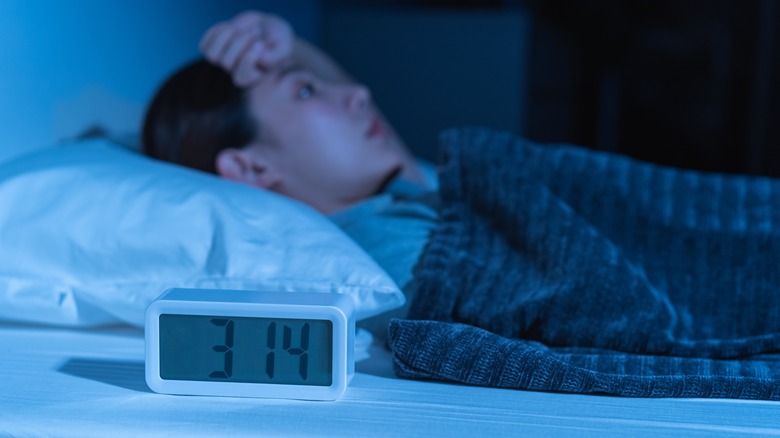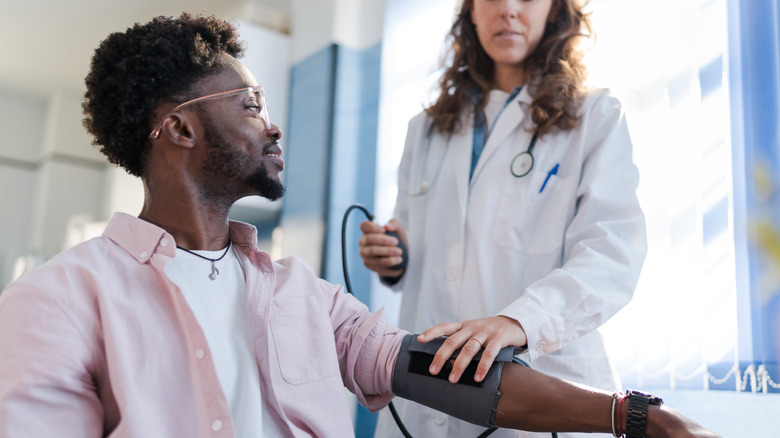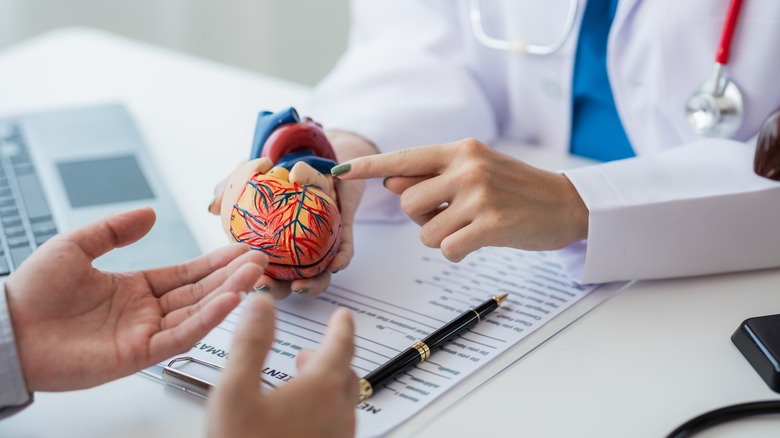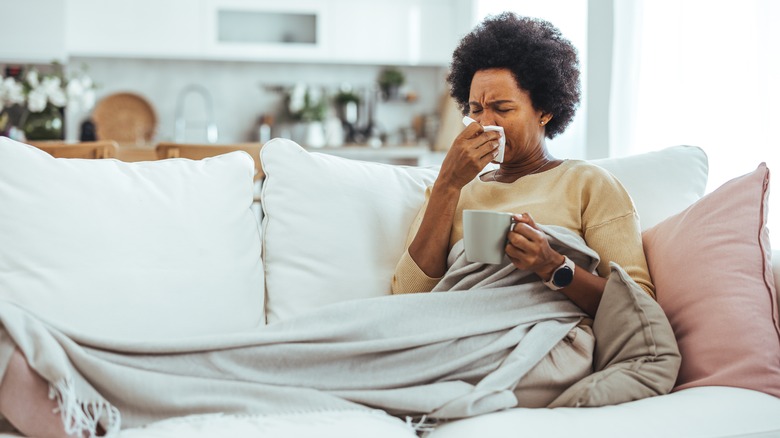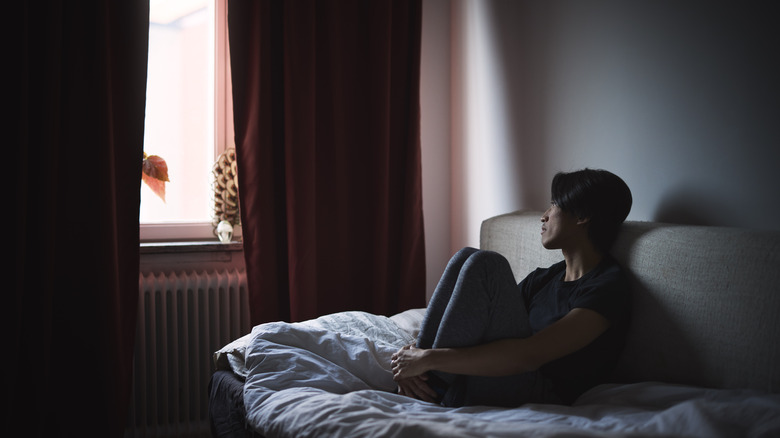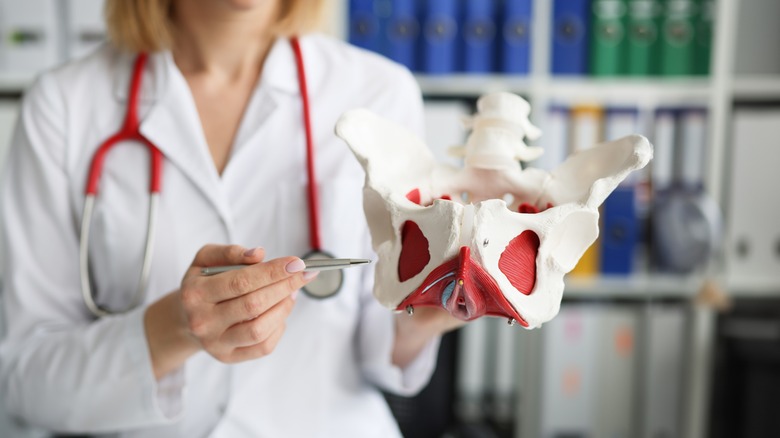When You Stop Having Sex, Your Risk Of These Medical Conditions Increases
Sex is an integral part of life. As one of the pillars of overall health (which also includes your physical, mental, and spiritual health), it plays a huge role in your personal growth and development (per Mayo Clinic). On the same note, by allowing for social and economic development, sex is widely involved in the growth and evolution of humankind by acting as the foundation of societies (per World Health Organization (WHO)). However, you might find yourself in a position where sex is just not currently happening, and since regular sexual activity is known to provide various health benefits, including improved heart health, reduced stress, and a strengthened immune system, not having sex might impact your well-being in more than one way.
A dry spell can happen for multiple reasons, including being in a long-distance relationship, going through a recent breakup, not finding the right person, or simply preferring abstinence. Another potential cause is dealing with low libido (aka low sex drive), which can happen from time to time due to hormonal imbalances, aging, stress, and underlying medical conditions like depression, anxiety, or chronic illnesses (per Cleveland Clinic). Regardless of the cause, the health effects might still be the same. This article explores which potential medical conditions might be more likely to happen when you stop having sex.
Insomnia
Are you struggling with fatigue, sleepiness, or brain fog during the day? Or having trouble falling or staying asleep at night? If so, you might be dealing with insomnia, a sleep disorder that can last anywhere from a couple of days or weeks to months (per Sleep Foundation). While you might think that sleep issues only interfere with your daily activities (which can already be troublesome enough), living with insomnia may actually cause a number of health concerns, including metabolic syndrome, weakened immunity, pregnancy complications, mental health disorders, heart disease, and breathing problems (per National Heart, Lung, and Blood Institute (NHLBI)). And while there are countless potential causes for sleep problems, lack of sex is often an underrated one.
According to a 2021 review published in the International Journal of Sexual Health, post-sex bliss, or more specifically, post-orgasm bliss, might be why sex could solve your sleep issues. Per the review, orgasms can help with muscle relaxation and reduce stress by lowering cortisol levels, all of which contribute to high-quality sleep. Yet, according to the review, partnered sex seemed to benefit sleepiness in men more than women, which was attributed to their higher likelihood of climaxing. However, and luckily for the gals, you don't need to rely on partnered sex for a good night's sleep, seeing that masturbation-induced orgasms can also do the trick. Similar results were found in a 2019 study published in Frontiers in Public Health, with both men and women reporting improved sleep quality after an orgasm, regardless of whether it was through partnered sex or solo.
High blood pressure
When your heart pumps blood, it does so with a specific amount of force to ensure it gets your blood flowing through your body. However, when the force of blood against the walls of the arteries is consistently too high, you develop high blood pressure (hypertension). Hypertension is an often silent condition that not only strains the heart and blood vessels but can potentially harm other organs and lead to serious health issues, such as heart disease, stroke, or kidney damage (per Centers for Disease Control and Prevention (CDC)). While the main risk factors for high blood pressure include obesity, diabetes, leading a sedentary lifestyle, following an unhealthy diet, drinking excessively, and smoking (per CDC), not having sex can surprisingly also affect your blood pressure readings, especially for women and people engaging in heterosexual sexual intercourse.
For example, a 2016 study published in the Journal of Health and Social Behavior found that sex may benefit women in terms of blood pressure regulation, likely due to the effects of sexual pleasure and emotional satisfaction, seeing that those who reported being extremely satisfied with their sexual experiences had a reduced risk of developing high blood pressure in the following years. Per the study, the effect was attributed to the higher levels of emotional bonding and intimacy women feel post-sex, which is known to help with stress management. Also, another 2006 study published in Biological Psychology found that people who had penile-vaginal sex had a better stress response than those who masturbated or who engaged in other types of sexual behaviors. The stress response was measured by a lower systolic blood pressure (the top number of a reading).
Heart disease
Heart disease encompasses a wide range of conditions regarding the heart or parts that belong or are connected to it, such as blood vessels, heart valves, and even its blood-pumping rhythm (per American Heart Association (AHA)). According to the same 2016 study published in the Journal of Health and Social Behavior, sex may act as a protective element for heart health by helping reduce inflammatory markers that can contribute to heart disease, namely C-reactive protein (CRP). The study explains that high CRP levels are a strong predictor of heart disease. However, it states that in men, regularly having sex helps reduce their CRP levels.
Plus, taking care of your heart involves engaging in physical activity. This is because exercise helps improve circulation and cut down on visceral fat (the kind that is more likely to increase inflammation and result in heart disease). Thus, exercise reduces multiple heart disease risk factors, such as blood cholesterol levels, blood pressure, obesity, and diabetes (per Cleveland Clinic). That said, having sex can help with your exercise goals. In fact, according to a 2012 study published in Circulation, sex can be considered a form of mild to moderate physical activity, something similar to light aerobic exercise, which would benefit both men and women alike.
Weakened immune system
Informedhealth.org states that our immune system comprises a collection of organs, specific cells, and proteins designed to keep us safe and healthy from external and internal elements, such as disease-causing microorganisms or cellular mutations (via National Library of Medicine (NLM)). Among its numerous disease-fighting cells, immunoglobulins or antibodies produced by white blood cells play a key role in defending you against diseases. More specifically, Statpearls lists immunoglobulin A (IgA) as one of the most abundant immune cells produced in the body, acting as a first-line barrier to protect the body's mucous membranes, which are the moist linings in areas like the genitals and digestive, respiratory, and urinary tracts, helping to keep these parts of the body healthy and in balance (via NLM).
Therefore, having low IgA levels can increase your chances of getting sick, and according to a 2015 review published in The Journal of Sexual Medicine, not having sex can have a direct effect on your IgA levels. Per the review, both men and women who reported having a moderate sexual frequency had higher IgA levels in their saliva than those with a lower and higher frequency. While the review doesn't specify what moderate sexual frequency is, a 2004 study published in Psychological Reports determined that college students who had sex up to twice per week had higher IgA levels than those who had sex either less than once or more than three times per week, which might help translate the previous sexual frequency uncertainty.
Prostate cancer
Prostate cancer is among the most frequently diagnosed cancers in men. It affects the prostate gland in the male reproductive system, which is responsible for producing semen, thus being vital for reproduction (per Mayo Clinic). While the causes of prostate cancer remain unknown, the site lists obesity, age, family history, and ethnicity as potential risk factors for the disease. Nevertheless, suspending your sexual activity also seems to be associated with higher chances of developing this disease.
According to a 2016 study published in European Urology, one potential reason could be explained by the prostate stagnation hypothesis, which states that by not having sex and, thus, halting ejaculation, cancer-causing substances might accumulate in the prostate, increasing the risk of facilitating mutations that lead to prostate cancer. On this note, a 2004 study published in JAMA found that for every three additional ejaculations per week throughout a man's life, the risk of developing prostate cancer is reduced by 19%. However, the good news is that if a lack of a sexual partner is what's causing your dry spell, there's no need to worry, seeing that since the effects are ejaculation-related, you could still reduce your prostate cancer risk by ejaculating through masturbation (via Harvard T.H. Chan School of Public Health).
Depression
Depression is a mood disorder that can severely impact your life by invading your mind and body with feelings of helplessness, sadness, emptiness, irritability, and a lack of energy and interest in things you used to enjoy, making it difficult to feel like you're living your best life (per National Institute of Mental Health (NIMH)). While factors that may increase your chances of depression often involve having a family history of depression, dealing with high stress levels, or going through a significant and negative life event, evidence shows that not having sex could also be linked to it.
On the one hand, a 2021 review published in the International Journal of Sexual Health explains that sex is closely linked to improved mood due to the release of multiple hormones during arousal and orgasm, including oxytocin, which is known for its antidepressant, stress-reducing, and anxiolytic effects. On that note, a 2022 article published in Preventive Cardiology shares that having sex once or more per week could make you feel as happy as earning a yearly sum of $50,000. On the other hand, the same review states that the depression-lowering effects of sex could extend to women who have condomless sex due to sperm's antidepressant compounds, including testosterone, zinc, and dehydroepiandrosterone (DHEA), which are easily absorbed by the vaginal walls. Yet, before engaging in unprotected sex, be sure to keep in mind its potential downsides, such as the risk of unwanted pregnancies and sexually transmitted infections (STIs).
Anxiety and stress
Stress and anxiety are emotional responses that are closely intertwined. A 2016 study published in the Journal of Health and Social Behavior explains that stress is the result of a hormonal cascade (which can be triggered by anxiety or by external causes) that eventually results in the production of the stress hormone cortisol. Yet, it turns out that sex can help release the body's natural anxiety-relieving and stress-reducing hormones called "endorphins" (via Healthline). Per the study, there are two pathways via which having sex helps keep the feelings of unease under control.
The first is by acting as a type of moderate exercise, which is known to promote endorphin production. The second is by providing a feeling of closeness and intimacy, which promotes calm and well-being. For example, according to a 2019 study published in Psychosomatic Medicine, partnered intimacy can reduce cortisol levels in women and help speed up the process of lowering cortisol levels back to normal after a stressful event in both men and women. In short, you could think of sex as your emotional support workout. Therefore, when sexual activity is reduced or stopped, you also lose the calming and mood-enhancing effects of endorphins, which may lead to an unwanted increase in stress and anxiety.
Erectile dysfunction
Erectile dysfunction (ED) happens when men can't get or keep an erection that allows them to perform sexually. It is commonly caused by heavy drug or alcohol intake; medical conditions like obesity, heart disease, hormonal imbalances, and sleep issues; or emotional factors like stress and anxiety (per Healthline). While having ED can undoubtedly have a negative effect on your sex life, research suggests that not having sex can also increase the likelihood of developing ED. For instance, a 2008 study published in The American Journal of Medicine discovered that the more often men have sex, the lower their risk of developing ED, with men who had sex at least once weekly being half as likely to develop ED compared to those who had less sex.
Similarly, another 2012 study published in the Journal of Huazhong University of Science and Technology found that men who had sex twice a week had a 63% lower risk of ED, while the risk reduction increased to 85% for those who had sex three or more times a week, compared to men who had sex less than once weekly. Although neither study explored the exact reasons for this connection, the positive effects of sex on ED could be linked to its role as a form of exercise. As a 2018 review published in Sexual Health states, besides boosting blood flow, physical activity promotes normal erectile function. Thus, regular sexual activity may similarly help maintain healthy blood circulation to the penis, reducing the risk of ED.
Impaired brain function
Thinking, learning, decision-making, and remembering or understanding information are all related to how your brain processes and uses facts to help you perform your daily activities. In other words, it refers to your cognitive function (per Medical News Today (MNT)). Per the site, you can mildly lose some of your cognitive functions with age, which is considered normal. However, when memory loss or confusion worsens within a year, you might be dealing with cognitive decline, which may hinder your ability to take care of yourself independently. Surprisingly, having sex might actually improve cognitive function and memory in older people.
According to a 2016 study published in Age and Ageing, which analyzed how sex affects thinking skills associated with decision-making and memory, older sexually active men tended to perform better in both tasks. Yet, for women, sex seemed to improve memory-related tasks specifically, suggesting that women may get an extra benefit for memory function from being sexually active. Similarly, another 2018 study of 6,016 people published in the Archives of Sexual Behavior found that among the elderly, those who still engaged in partnered sexual activities and enjoyed emotional closeness showed improved memory functions, with sex having a more significant positive impact on older participants. Therefore, you might want to consider the effects of abstinence on brain function when you stop having sex.
Increased feelings of pain
According to StatPearls, our skin, muscles, organs, joints, and bones have a type of nerve fibers called "nociceptors," which are sensory receptors that signal to your brain whenever there are painful stimuli (via NLM). As the American Physiological Society (APS) explains, that type of pain is called "nociceptive." In contrast, inflammatory pain is another type of pain that happens when your body produces inflammatory markers, while pathological pain occurs when some of your nerve cells become damaged and generate feelings of pain even when nothing is harming them. While it might seem unrelated, not having sex might increase the risk of experiencing pain because your body misses out on its natural pain-relieving effects.
For example, according to a 2010 review published in The Journal of Sexual Medicine, prostatodynia, or prostate pain, was not only associated with not having penile-vaginal sex but could also be improved by engaging in heterosexual sexual activity. On the same note, a 2021 review published in the International Journal of Sexual Health reported that migraine patients experienced moderate to complete relief from migraines during sex. Both reviews agree that vaginal stimulation has strong analgesic effects. Additionally, the latter review notes that sex also works as a pain-relief agent by distracting you from pain and promoting the production of endorphins and oxytocin, your body's natural painkillers.
Weakened pelvic floor muscles
Your pelvic floor muscles are the ones in charge of keeping your reproductive organs, bladder, and bowels in place. They also keep you from accidentally peeing yourself when you laugh or sneeze and ensure you have pleasurable sexual experiences, seeing that these muscles contract whenever women have orgasms (per National Association for Continence) and help men attain erections (per MNT). Unsurprisingly, when you stop having sex, it may lead to weakened pelvic floor muscles due to the lack of regular engagement and contraction. In other words, regular contraction of these muscles helps keep them toned and strong, similar to how other muscles in the body benefit from exercise.
For example, according to a 2010 review published in The Journal of Sexual Medicine, having penile-vaginal sex helps keep pelvic muscles toned in women. On the same note, a 2021 study published in Investigative and Clinical Urology determined that sexually active women and women who experience orgasms had stronger pelvic floor muscles than those who were sexually inactive. In essence, this means that just like Kegel exercises, sex offers a way to actively maintain healthy pelvic floor muscles, making it an essential part of overall pelvic health.

